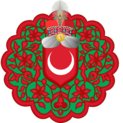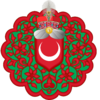Emirate of Takia
This article refers to a micronation or element of micronationalism which is defunct and no longer exists. You can help make the article reflect that or ask on the talk page for further information. |
This article uses a non-standard infobox to display information. Please transcribe the information to a standard infobox appropriate for the article. |
Emirado de Takia (pt) | |||
| |||
| Motto There is no victory except in God | |||
| Capital city | Masbahá | ||
|---|---|---|---|
| Largest city | Masbahá | ||
| Official language(s) | Esperanto (de jure) Portuguese (de facto) | ||
| Official religion(s) | Islam and Protestantism | ||
| Demonym | Takian (eng) Takiane (pt) | ||
| Government | Emirate | ||
| - Emir | Filipe Al Fradiq I | ||
| - Mir | José Abdallah | ||
| Legislature | Unicameral | ||
| - Foundation | 11 February 2015 | ||
| - Independence from Badakistan | 01 January 2016 | ||
| Date format | dd-mm-yyyy | ||
Takia, officially the Emirate of Takia (Portuguese: Emirado de Takia), is one of the first known micronations originating from Brazil which adopted the Persian Arab culture as the main feature of the micronational project. Takia is a simulationist monarchy of Persian tradition, with Arabic and Ottoman influences. It was a member of the Confederação de Futebol Micronacional.
History
A monarchy since its foundation on 11 February 2015, the state power is divided between the Emir, currently Filipe I[1] and the Council of State. From the creation of the Emirate until January 2016, Takia was ruled under a Provincial Constitution, which proved to be unfeasible for the process of opening and modernization of the micronation. Soon after independence restoration announcement on 1 January 2016, the government revoked the constitution and the Emir began to rule by decree.[2]
The Emirate of Takia today is a micronation in development, seeking for friendship between people and the growth of its influence in the region and have as one of its main goals the revitalization of the micronational practice, severely punished by totalitarianism and a broad network of conspiracies.[3]
National colors and symbols
-
National Flag
-
Grand Seal
Politics
In accordance with the current Constitutional Charter, the Emir of Takia has legal personality with special privileges to be achieved the purpose of national interest.[4] The purpose of government is to ensure the existence of the Emirate. The Emir should ensure internal order, ensure sovereignty in the international order, draw rules of conduct and distribute justice. In this context, it is part of the Court and the Aristocracy, with the purpose disciplinary relations between the various people and Emirate agencies, as well as between its members.[5]
The Emirate of Takia has only two departments bringing together all state requirements. The departments have direct connection with the Emir of Takia, therefore, are an integral part of the country's government: The departments are divided into Secretary of the Interior and Secretary of the Foreign Affairs.[6]
Secretary of the Interior
The Secretary of the Interior brings together the Department of Communications,[7] section responsible for the communications of the Emirate with the inner and outer world. In addition to this, the Secretary of the Interior also brings together the Department of Education, Science and Culture[8] which is the section responsible for promoting the items contained therein. Both departments are responsible for the promotion, development and implementation of public policies for the population of the Emirate of Takia.
Secretary of the Foreign Affairs
The Secretary of the Foreign Affairs is liable for the interests o the Emirate outside its borders. It brings together the Department of Foreign Affairs, section known by micronationalism that manages exterior relations with friendly nations. It also promotes the understanding between nations and the maintenance of peace. The Department of Foreign Affairs is connected directly to the Government of the Emirate of Takia, having its head in the person of the Emir.[9]
See also
External links
References
- ↑ "The Emir", Government of the Emirate of Takia, 09 April 2016 (in Portuguese)
- ↑ "Datasheet", Government of the Emirate of Takia, 09 April 2016 (in Portuguese)
- ↑ "Datasheet", Government of the Emirate of Takia, 09 April 2016 (in Portuguese)
- ↑ "Institutional", Government of the Emirate of Takia, 09 April 2016 (in Portuguese)
- ↑ "Institutional", Government of the Emirate of Takia, 09 April 2016 (in Portuguese)
- ↑ "Institutional", Government of the Emirate of Takia, 09 April 2016 (in Portuguese)
- ↑ "Institutional", Government of the Emirate of Takia, 09 April 2016 (in Portuguese)
- ↑ "Institutional", Government of the Emirate of Takia, 09 April 2016 (in Portuguese)
- ↑ "Institutional", Government of the Emirate of Takia, 09 April 2016 (in Portuguese)



